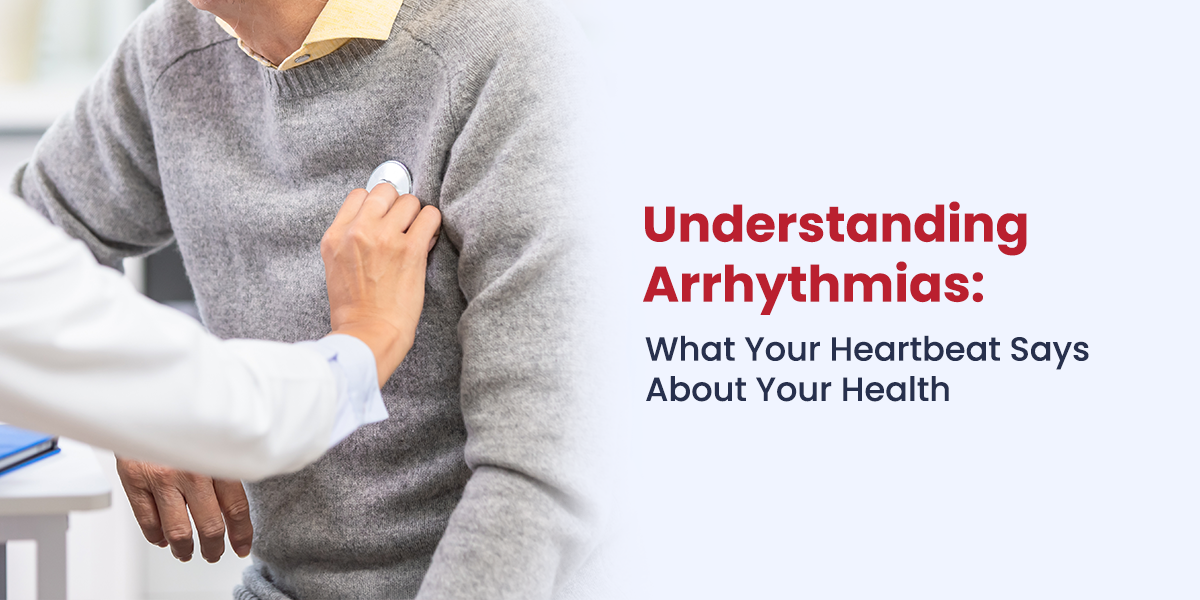Understanding Arrhythmias: What Your Heartbeat Says About Your Health

Have you ever felt your heart racing or skipping a beat, even when you’re at rest? These irregularities, known as arrhythmias, occur when your heart’s rhythm isn’t functioning as it should.
Arrhythmias can range from harmless episodes lasting just a few moments to serious conditions requiring immediate attention. Some may come with noticeable symptoms, while others go unnoticed. The impact and prognosis often depend on the individual and the underlying cause.
What is Arrhythmia?
Cardiac arrhythmia, or abnormal heartbeat, is a condition that can start from any part of the heart. It could radiate too fast, too slow or irregular sensations.
Under normal conditions, your heart beats in a synchronised manner. Issues in various parts of your heart or blood matters circulating to it can trigger several heart arrhythmia symptoms. Having a normal heartbeat matters as your heart is your vital organ supplying oxygenated blood to your body.
Is Cardiac Arrhythmia Serious?
Some cardiac arrhythmia types are harmless and do not require much medical intervention. Others with evidently persistent symptoms may put you in cardiac arrest.
Types of Cardiac Arrhythmia You Should Know About
The common arrhythmia types are categorised based on the spot where they occur.
Ventricular arrhythmia
This is developed in the ventricles of your heart or lower chambers.
Supraventricular arrhythmia
This begins in the atria of your heart. The word ‘supraventricular’ indicates above your ventricles.
Bradyarrhythmia
Bradyarrhythmia or junctional rhythms happen when your heart conduction system shows abnormality.
Is Arrhythmia a Common Scenario?
Many people suffer from arrhythmia. However, not every individual exhibits symptoms. Nor are they the same in all individuals. It thus becomes difficult to estimate the exact counts of individuals dealing with this medical condition.
Suggested Read: 10 Warning Signs of Coronary Artery Disease You Should Never Ignore
Heart Arrhythmia Symptoms
The heart arrhythmia symptoms include:
- Dizziness
- Lightheadedness
- Heart palpitations
- Discomfort in the chest
- Fainting episodes
- Breath shortness
Often Cardiac arrhythmia could be symptomless and a silent killer. Wondering if your irregular heartbeat is a cause for concern? Get expert insights from the best cardiologist in Lucknow and Kanpur to understand and manage arrhythmias effectively.
Underlying Causes of Arrhythmia
- Irritable heart tissues
- Valve disorders
- Injuries or past traumas from heart attack
- The healing process following heart injuries
- Coronary artery disease
- High blood pressure
- Alterations in your heart muscles
What are the Associated Risks of Arrhythmia?
- Addiction to tobacco and alcohol-based products
- Consuming caffeinated drinks
- Consuming stimulants for cold
- Herbal supplements
- High blood pressure
- High blood sugar levels
- Sleep apnea
Diagnosing Arrhythmias
Your cardiologist will ask you to undergo the following tests in diagnosing whether you are susceptible to arrhythmia or not:
- Blood tests determine electrolyte imbalances.
- Stress test
- Electrocardiograms
- Echocardiograms
- Computed tomography
- Heart MRIs
Arrhythmias Treatment
Treating arrhythmias depends mainly on its type and severity. In mild cases, there is no need for any medical support or intervention. Elsewise, the treatment regime includes
Medications
There are many medicines available for treating arrhythmias, such as antiarrhythmic drugs and anticoagulants.
Lifestyle Alterations
Transforming your lifestyle can help you manage your arrhythmia in a better way. These changes include but are not limited to:
- Avoiding tobacco, caffeinated, and alcoholic products.
- Maintaining a healthy weight.
- Dietary changes.
- Adopting a healthy exercise routine.
- Monitoring and managing the levels of your blood and sugars in it
Therapies for Arrhythmias
Cardioversion
An electrical impulse helps in synchronising your heart to allow your rhythm to go back to normal.
Catheter Insertion
Catheters are inserted to send high-frequency electrical signals to even the most minor areas of your heart tissues. This helps disconnect the pathways of abnormal rhythms.
Pulmonary Vein Isolation
This ablation type creates scar rings for isolating areas that are susceptible to atrial fibrillation. This can help ease the frequent occurrences of atrial fibrillation.
Takeaway
Arrhythmias are easily treatable with medicines, and you can adjust your lifestyle with a positive mindset. However, if left untreated, it could lead to life-threatening conditions such as stroke and heart failure. Talk to your doctor about adopting a better lifestyle and dietary changes to stay away from arrhythmias. Extreme fatigue and irregular heart palpitations are your warning signs to meet your doctor. They are the best at deciding what treatment regime suits your condition.

 Call-an-Ambulance
Call-an-Ambulance



